‘Dawn Treader’ Film May Hit Story Sandbars, Part 2
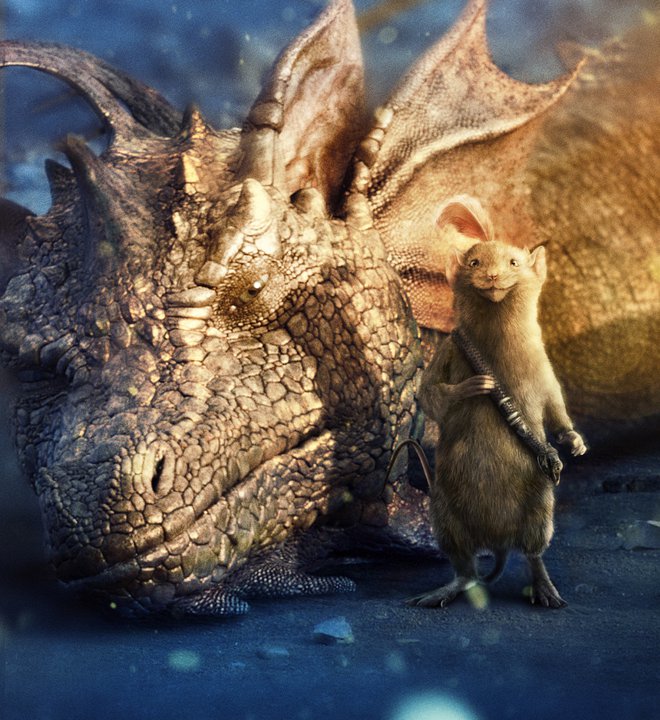 This time I’ll begin with positive news: this photo from The Voyage of the Dawn Treader film.
This time I’ll begin with positive news: this photo from The Voyage of the Dawn Treader film.
Yes, for those familiar with the book, it’s a classic image: Eustace, now finally sobered, turned into a dragon because of his existing beastliness and greed — his inner nature brought out into his appearance. With him, still noble and kind, is Reepicheep, the most valiant mouse in Narnia.
If the films presents their relationship this way, I’ll likely not mind other revisions so much.
Last week I shared some uncertainties about Walden Media’s coming third Chronicles of Narnia film, which is based on the third book in C.S. Lewis’s classic series. Fox is distributing the film, which will release Friday, Dec. 10 in the U.S., and last month director Michael Apted seemed to be saying that much of the film is based on material Lewis did not actually write.
Now I’ll turn to what elements the film seems to have gotten right, along with other dubious points that pre-released images, interviews, etc., seem to have indicated won’t be so canonical. Last year I made several suggestions/predictions about the film on Spec-Faith. How did I do?
1. Better Aslan focus.
Aslan could be improved visually in Voyage. But in terms of story, he needs to be even bigger. Though in the book he only makes “cameo” appearances, there is a constant sensation that the Lion who created and sustains Narnia is always there, guiding the ship and its crew, even if you cannot see him. This sense of Providence must be preserved. It will make Voyage even deeper.
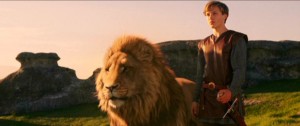 So far as we’ve seen, Aslan looks awesome, anyway. As I have hoped since 2005’s The Lion, the Witch and the Wardrobe, the Lion has grown over the last five years — just as he told Lucy, in Prince Caspian (a line botched in the film) that “every year you grow, you will find me a little bigger.” Compare Aslan in LWW standing with Peter, to him in Voyage near the taller Caspian.
So far as we’ve seen, Aslan looks awesome, anyway. As I have hoped since 2005’s The Lion, the Witch and the Wardrobe, the Lion has grown over the last five years — just as he told Lucy, in Prince Caspian (a line botched in the film) that “every year you grow, you will find me a little bigger.” Compare Aslan in LWW standing with Peter, to him in Voyage near the taller Caspian.
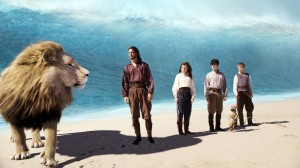 As for Aslan’s story emphasis in the film, that remains to be seen. Many fans are worried about an apparent story shift, away from the book’s main story of finding seven lost lords and finally coming to Aslan’s Country at the end of the world. Instead they may focus on a quest to find the seven lords’ (magical?) swords and save Narnia from an evil threat. What will that do for Aslan? Ultimately not much, if it’s clear he is sovereign and a constant presence during the story even when he is not seen. Despite previous films’ flaws, they mostly got that aspect right.
As for Aslan’s story emphasis in the film, that remains to be seen. Many fans are worried about an apparent story shift, away from the book’s main story of finding seven lost lords and finally coming to Aslan’s Country at the end of the world. Instead they may focus on a quest to find the seven lords’ (magical?) swords and save Narnia from an evil threat. What will that do for Aslan? Ultimately not much, if it’s clear he is sovereign and a constant presence during the story even when he is not seen. Despite previous films’ flaws, they mostly got that aspect right.
And those who yearn, as I do, to see Aslan’s Christ-exalting revelation to the children preserved in the film will find encouragement from this article from Christianity Today, still uncontradicted:
[Kathy Keller, after seeing much of the film footage:] “I’m glad the final interaction between Aslan and Lucy was there in its unadulterated entirety, because I consider that the pinnacle of the entire seven books.” (Near the end of book, Lucy is sad that Aslan is sending her back to her world, and sobs, “How can we live, never meeting you?” Aslan assures Lucy that he’s very much in her world, where he has “another name. You must learn to know me by that name. This was the very reason why you were brought to Narnia, that by knowing me here for a little, you may know me better there.”)
2. No added mega-battles.
Voyage is a different kind of story. Whenever someone draws a sword it’s more for a skirmish — I recall from the book some tangling with slave traders, and the scary fight against a sea serpent. Most of the tension comes from the battles that might happen, not the ones that actually do. […] Voyage is a high-seas adventure tale. It doesn’t need a Huge Climactic Battle Sequence. To decide otherwise would be not only to opt for cheap CGI tricks, but deny the story’s true appeal.
You might guess what happened. Battles aplenty are clear to see from the film’s trailers and plot synopses. Rounding up seven magical swords and fighting an “evil green mist,” with or without a nightmare-induced White Witch vision (yep), takes some duking-out.
From what I’ve read, the film adds to the first scenes set on the Lone Islands, in which King Caspian and his friends use only cunning and bluff to retake the Narnian territory’s government. But cunning and bluff aren’t as popular as derring-do and sword smackdowns; I can understand that. It’s the hints that slaves’ souls are being fed to some evil green mist that are questionable.
Yet I will go on the record regarding the sea serpent with two predictions: that fight will be extended, and I also believe the story will be adjusted just a little to allow Eustace to fight the beast further — perhaps even while he is still in dragon form.
Ask and ye shall receive! But fortunately it sounds like the filmmakers remembered something I forgot while writing that: to have Dragon-Eustace fight the sea-serpent could seem like he’s “earning” the forgiveness that Aslan later gives him. CT noted:
Keller says she learned that writers originally wanted Eustace, still in dragon form, to fight a sea monster and “earn” his return to human form. But she says [Walden Media president Michael] Flaherty, a committed Christian, “put them straight that you don’t earn grace, you receive it once you are humbled and aware of your need.”
Flaherty told CT, “This book is the most theological of them all. There are more complex themes, particularly grace, that aren’t easy to get right [in a movie]. We must’ve spent an entire day talking about grace, and the importance of showing that it can’t be earned; it has to be given. This is something that Eustace can’t do on his own; he has to ask Aslan to do it for him. I think it’s a really powerful illustration of grace.”
What an amazing truth could be shown here: that Eustace, despite all his best efforts, not only could not shed his dragon-skin, but could not fight the sea-serpent. Only Aslan could save him.
3. Make Eustace memorable.
Voyage screenwriters don’t need to deepen or “flesh out” Eustace. C.S. Lewis has already done so. I hope they will resist the temptation to change Eustace in other ways, either after or especially before his transformation. Don’t make him beastly-acting just because his Parents Neglected Him, or because he is Shocked By His Unfamiliar Environment or because Someone Really Was Mean to Him or anything like that. Instead, Eustace should be beastly because that is his nature.
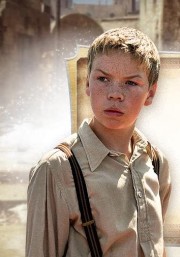 Those who have seen Will Poulter, who plays Eustace, or caught sight of his performance in film trailers or clips will know that he has captured Eustace perfectly.
Those who have seen Will Poulter, who plays Eustace, or caught sight of his performance in film trailers or clips will know that he has captured Eustace perfectly.
But does the film try to add squishy, silly explanations for why Eustace is such a prig? So far I haven’t seen much one way or the other. Given the writers’ tendencies, however, to make the noblest characters more jerky and ignoble than their book versions (cough, such as Peter in Prince Caspian), it stands to reason they’ll understand quite well Lewis’s actual book portrayal of a character who is like that. There’s no need to excuse Eustace because of his circumstances.
4. Enhance musical themes.
A new composer (David Arnold) is on board for this Voyage. I’m unfamiliar with the rest of his film work, yet his score for Amazing Grace was personal, melodic and appropriately evocative of the film’s mix of history and personal faith journey.
[… Voyage] needs themes of loyalty, bravery, adventure, and especially redemption. Yet it also needs themes as in musical themes — Aslan needs a more-awesome theme, Eustace/redemption needs a theme, and surely the composer will set Reepicheep’s destiny-in-the-East-style lullaby to music as well?
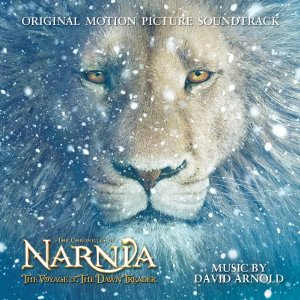 To an extent, I’m more optimistic of Arnold’s film score than I am about the film itself. That’s especially because of what he told NarniaFans.com:
To an extent, I’m more optimistic of Arnold’s film score than I am about the film itself. That’s especially because of what he told NarniaFans.com:
I re-read the entire Narnia series so I could immerse myself in the world. I didn’t re-watch the earlier movies but I wanted the spirit of the books in me. When I saw the film I realised that obviously things can’t be as they were exactly in the books, but I hope the music captures the spirit of what was intended by C.S. Lewis.
[…] I have a theme for the Dawn Treader itself, which becomes a defacto home for everyone as they sail off on their journey to find their actual homes, both spiritually and actually. There is a Reepicheep theme which reflects his desire to find Aslan’s country, his sense of decency and bravery and above all his optimism for everyone, the world, the Pevensies and himself. There is a theme for the ‘mission’ of finding the missing Lords and their Swords, a ‘temptation’ theme as the children are tempted and tested one by one and of course something dark for the Green Mist which symbolises and epitomises all that is evil in this film.
Sounds great thus far. The score, by the way, releases Tuesday before the film’s release.
Next week: how’d they do with marketing this time, or avoiding non-canon mush, or “Star Girl” as an expanded character (hint: it doesn’t sound good) or portraying Aslan’s Country?


































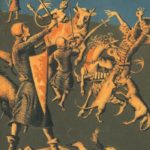
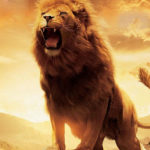

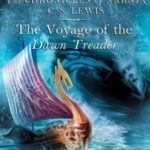




There’s no need to excuse Eustace because of his circumstances. C. S. Lewis built in some explanation, though. Remember he said Eustace hadn’t read any of the right books? And he paints his parents as progressives. I don’t think there’s a solid “original sin” explanation for Eustace’s behavior in the book.
Consequently, I think the movie can stick closely with the book. Original sin is a hard motive to show. I’m guessing that’s why the first movie tried so hard to show why Edmond did what he did.
Their treatment of Peter, however, was the weak point in both movies. They tried to make him flawed, which is consistent with the current trend that says good characters still must be shown as flawed and evil characters must still be shown as having something basically good. (OK, they don’t say it that way, but how else are we to interpret the “society made me do it” angle?)
Becky
I’m not sure that this movie can still be good, but I am waiting to see if it is or not. 🙁
[…] This post was mentioned on Twitter by Speculative Faith, Will Poulter Fans. Will Poulter Fans said: A lot of news happening recently. This article provides in-depth criticism about VDT and Will's character,… http://fb.me/x5EPEvpB […]
Update: NarniaWeb has released the Voyage of the Dawn Treader soundtrack list of tracks, 30 of them that will total 72 minutes of listening time. That’s quite a substantial score, especially compared with Harry Greggson-Williams’ work on the previous two films. (However, the Prince Caspian score, sadly, seemed about half copied and barely remixed from the Lion, the Witch and the Wardrobe score).
Track names? They start with these 20 (‘ware spoilers!):
That gives you some idea of the adaptation: as fans have known for a while, they will switch the islands around. The Lone Islands will still be first, but the Magician’s Island will come before Dragon Island, which will be combined with Deathwater Island; and the Dark Island, now the climax of the film, will follow the voyagers’ arrival at Ramandu’s Island. Though perhaps the writers could have found a way to connect the islands “better” (in their view), while preserving the book’s order, I remain optimistic about the soundtrack’s emphasis on each person’s temptation — which enhances that theme from the book, and does not focus on all this “green mist”/seven-swords searching stuff.
[…] Chronicles of Narnia: The Voyage of the Dawn Treader, has helped me a lot. In this miniseries’ last installment, and even more so in part 1, I was more pessimistic, concerned the film had sacrificed themes of […]